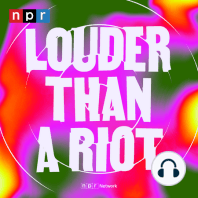52 min listen
My Brother's Keeper: Bobby Shmurda (Pt 3)
ratings:
Length:
60 minutes
Released:
Nov 19, 2020
Format:
Podcast episode
Description
Six years after his arrest, Bobby Shmurda's fans are still anxiously awaiting his return. The rapper ultimately stayed loyal to his crew in court, but the chokehold of conspiracy law also left him with few other options. In our final chapter of Bobby's story, we follow his legal drama: cycling through defense lawyers, being strong-armed by prosecutors and making last-ditch outbursts in court. Finally, we sit down with Bobby in prison as he looks to his future on the other side of his cell.
Released:
Nov 19, 2020
Format:
Podcast episode
Titles in the series (28)
The Conspiracy Against Hip-Hop: Why are hip-hop and mass incarceration so entangled in America? How did they become that way? A mysterious letter sends us back in time to find out. by Louder Than A Riot
